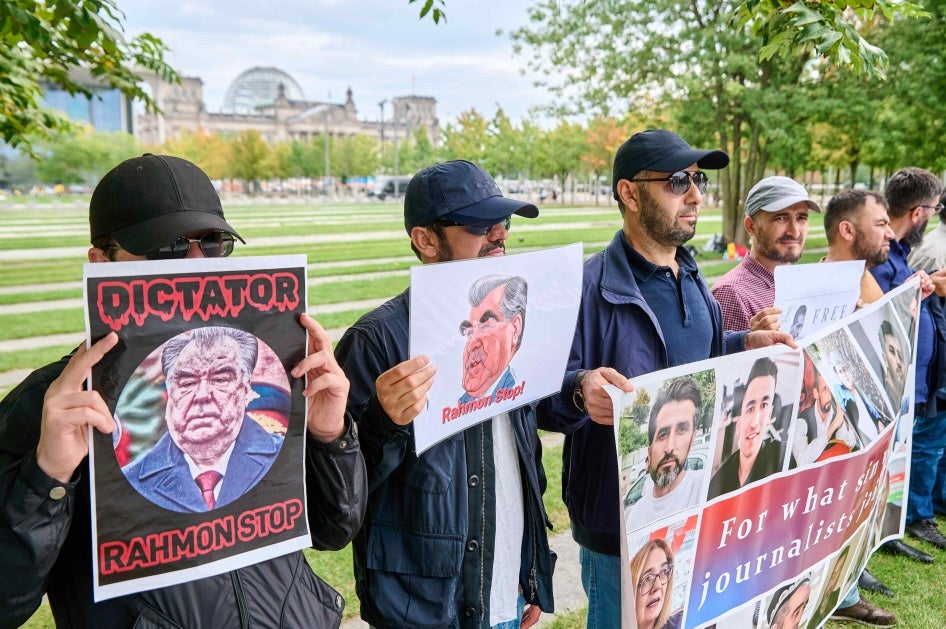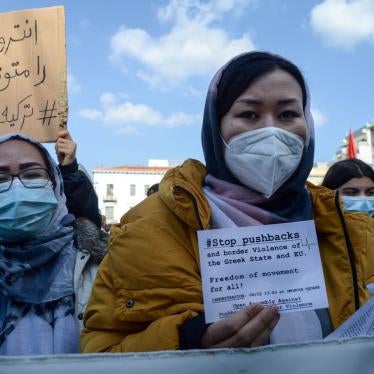(Berlin, April 16, 2024) – Several people based in Lithuania, Poland, and Türkiye, linked to a banned Tajik opposition movement, Group 24, have in recent months disappeared or have been arrested and threatened with extradition to Tajikistan, Human Rights Watch and the Norwegian Helsinki Committee said today.
Group 24 is a political movement promoting democratic reforms in Tajikistan, which the Tajik government banned and designated a terrorist organization in October 2014. Tajikistan has for the last decade sought the extradition of exiled activists in other countries, some of whom also have been killed or forcibly disappeared. Host governments should not deport the people concerned to Tajikistan because of the risk of torture and should respect Tajik asylum seekers’ full due process rights, including not arbitrarily detaining them at the behest of unfounded and politically motivated requests by the Tajik government.
“Tajikistan should unequivocally end its decade-long hunt of perceived critics abroad, especially those related to Group 24 and other banned groups,” said Syinat Sultanalieva, Central Asia researcher at Human Rights Watch. “The EU and Türkiye should protect opposition activists and refrain from returning them to Tajikistan, a country known for engaging in transnational repression, where they risk being tortured.”
Human Rights Watch recently published a report on transnational repression – targeting of critics abroad by repressive governments – that includes several cases of members of Group 24, both former and active, who had fled the country only to be targeted by the Tajik government, seeking their arrest and extradition to Tajikistan on charges of terrorism or extremism-related activities. Activists in exile have also been subject to enforced disappearances or abusive use of Interpol Red Notices, which is a request to law enforcement worldwide to locate and provisionally arrest a person because a government is seeking their extradition.
On April 5, 2024, Lithuanian security services detained Sulaimon Davlatov, a former member of Group 24, in Vilnius on charges of allegedly violating Lithuania’s national security. On April 7, a court in Vilnius ordered his pretrial detention for two months, and on April 9 the Lithuanian Prosecutor General’s office told the media that Davlatov “presents a threat to the national security of Lithuania due to his cooperation with members and allies of terrorist organizations, extremist movements and propaganda of extremism.”
Davlatov has been a resident of Lithuania since he was granted asylum in 2015. Lithuanian authorities should rule out any risk that Davlatov could be extradited to Tajikistan, and in line with fair trial rights, grant Davlatov and his lawyer immediate access to any evidence they have to substantiate the allegations.
On February 23 and March 10 respectively, two senior figures in Group 24, Nasimjon Sharifov and Sukhrob Zafar, disappeared in Türkiye. Both had previously been detained by the Turkish police in March 2018 at the request of Tajik authorities and threatened with extradition but were eventually released. They had recently told family and colleagues that they were receiving regular threats from Tajik intelligence services. Neither man’s whereabouts is currently known. Friends and colleagues are concerned that they may have been forcibly disappeared by either or both Tajik and Turkish authorities and extrajudicially removed to Tajikistan.
On March 19, a court in Poland ordered Komron Khudoydodov, brother of former Group 24 activist Shabnam Khudoydodova, to leave Poland by April 19 voluntarily or be deported to Tajikistan. This followed the rejection of his application for asylum. Khudoydodov moved to Poland in 2018 on a humanitarian visa from the Polish authorities granted because he faced persecution in Tajikistan due to his sister’s peaceful political activity. In 2015, Tajik authorities had Shabnam Khudoydodova placed on the Interpol Red Notices on charges of extremism.
Tajik authorities also have an ongoing criminal investigation against Komron Khudoydodov on charges of extremism. Returning Khudoydodov to Tajikistan would place him at risk of torture or ill-treatment, and therefore be a violation of the ban on refoulement. Poland should make clear that it will abide by its international legal obligations and rule out deporting Khudoydodov to Tajikistan.
In addition to Lithuania and Poland, other European Union members, such as Austria, Germany, and Slovakia, have in recent years returned or threatened to return Tajik asylum seekers to Tajikistan despite credible evidence of their risk of being tortured. Upon their arrival in Tajikistan, those deported from the EU member states have been jailed.
The United Nations Convention against Torture and other Cruel, Inhuman or Degrading Treatment or Punishment, prohibits the expulsion, return (refoulment), or extradition of a person to another state where there are substantial grounds for believing that they would be in danger of being tortured. The European Convention on Human Rights also incorporates this ban as an element of the prohibition on torture and inhuman and degrading treatment. All EU member countries and Türkiye are party to both treaties. This principle is also incorporated into Lithuanian, Polish, and Turkish domestic law.
“EU member states and Türkiye should uphold their international human rights obligations, including not to return people at risk of torture and persecution for their political activism to their country of origin,” Sultanalieva said. “They should denounce cases of transnational repression and review any cooperation agreements with states engaged in targeting critics abroad.”









